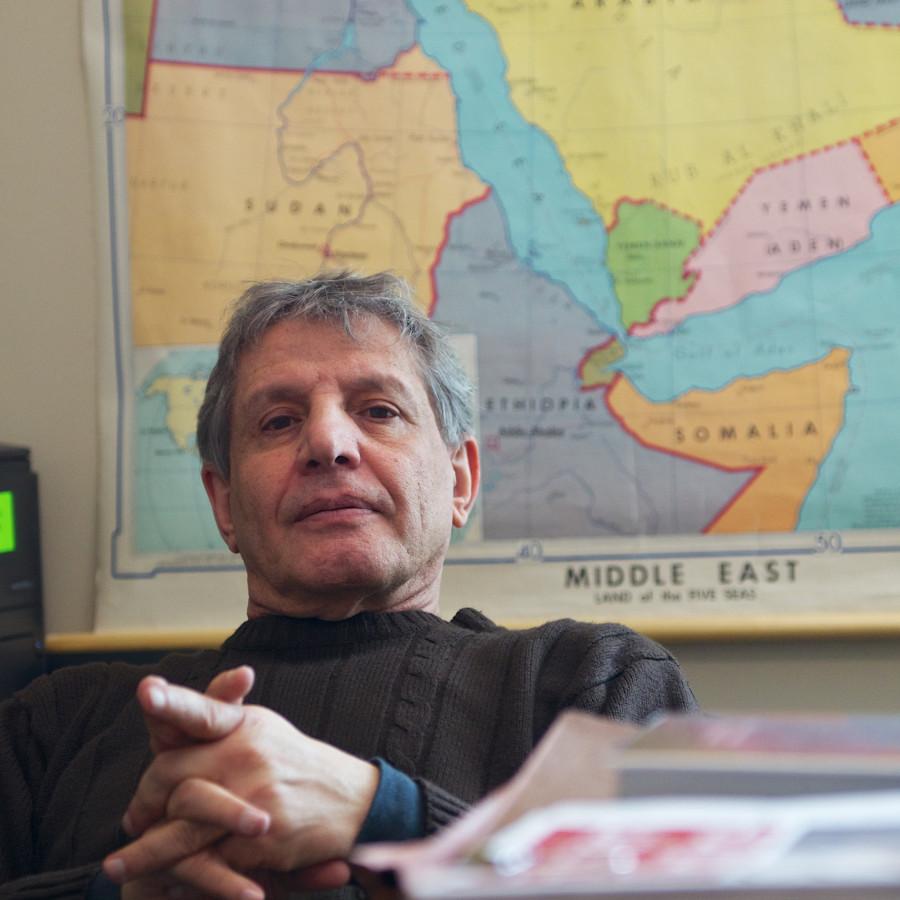Professor educates on tension in Middle-Eastern countries
March 5, 2014
Raised in Iran and educated in America, Majid Sharifi aims to problematize the complexities of the U.S.-Iran relationship, which he says is a byproduct of over a century of political turmoil in Iran.
Sharifi, a government professor at EWU, gave a presentation on Feb. 20 based on his new book, “Imagining Iran, the Tragedy of Subaltern Nationalism.” The book argues that ruling regimes in Middle-Eastern countries, such as Iran, have continuously failed to nationalize their official identities.
In contrast, successful nation-states, says Sharifi, are able to nationalize their official state identity, creating a shared sense of oneness between the state and the people.
The result has been tragic because the populations of these countries, like Iran, learn to identify with contending visions of the national self, with each population seeing the others as their enemies. He believes these failures have caused a series of regime changes.
The failure to nationalize their identity creates what Sharifi calls a “subaltern nation,” whose collective desire is to become developed, democratic and constitutional. The problem is that the collective mind of all subaltern nationalists is conflicted with itself. This makes it more likely that their nationalist movements would fail in the future, as they have failed in the past.
“That is why I have called this a tragedy,” Sharifi said.
Sharifi was raised in Iran before the 1979 revolution, a time when Iranians had a similar resentment toward their regime as they do today. He was at the heart of what he calls the “political beast of Iran.”
He moved to the U.S. during the 1979 Iranian revolution. His brother and three sisters still live in Iran today, and Sharifi continually visits his home country.
The perspective of someone who has lived in Iran, compared to that of someone who simply watches the news, is a huge difference in his mind. Living in a different social context gives people a comparative point of reference, which allows them to understand different cultures better.
He believes the American public simply cannot understand certain things about the Iranian people and their politics. This is from having lived their whole lives in the same country and being exposed to the mainstream media that tends to confuse rather than inform them.
“Many people in this country have no analytical or comparative point of reference,” Sharifi said. “Of course, this is caused by a set of political factors that can, in fact, threaten our democracy in this country, as well as retard, as it has, democratic development in Iran.”
Nationalism, Sharifi explains, is similar to the relationship between circus performers and their audience: It needs to be performed, and performed well. Under the circus tent, the gaze of the audience is directed toward the performance on stage. Similarly, the gaze of a national audience is focused on the performance of the governing regime of the country. If the performance of the circus players, or the ruling regime, is liked and understood, then the performers capture the imagination of their audience. This empowers them to go work, vote, or go to war and die for their country.
In contrast, a subaltern state fails to capture the imagination of its national audience, resulting in the failure of the state to nationalize its official identity, legitimize its sovereign authority or popularize its policies, Sharifi says. It can neither mobilize its people for war or organize in peace.
When asked the difference between nationalism and patriotism, Sharifi said nationalism is the necessary foundation for the production of patriotism. However, patriotism involves a greater sense of pride in one’s country.
“Nationalism is the political connection that makes millions of people, who do not otherwise know each other personally, see themselves as a people with a collective sense history, destiny and national interest,” Sharifi said.
Kristin Edquist, another EWU government professor and director of international affairs, applauded the way Sharifi explained this issue. According to her, Sharifi’s expertise comes more from his scholarly work than his childhood in Iran.
“He’s not really coming at it from the perspective of someone who wasn’t raised in the U.S.,” Edquist said. “He’s coming at it from a scholarly perspective.”
She said Sharifi is not trying to solve the problems in Iran. Instead, he is redefining what the problem is.
It is easy for Americans to characterize Iranian people by their political leaders they see on TV, and Edquist said this is a profound misunderstanding of the population.
“The nation, really, is in a lot of ways alienated from the governing bodies,” Edquist said.
Edquist is working with Sharifi, along with Vandana Asthana, who is also a government professor at Eastern, on a book examining insecurity in the Persian Gulf and Southeast Asian states.
“He adds a lot of vibrancy to the intellectual community here,” Edquist said about Sharifi.
Additionally, when she teaches students about Iran, she stresses how modern the country is in many ways. Students are frequently surprised to learn that there are women politicians who have a strong role in Iranian politics.
Part of Sharifi misses the Iranian culture. But whenever he visits, whether he is at a speaking event or he is traveling, he cannot help but notice similarities the people living across the world have with Americans.
“It’s amazing how close we are,” he said.









